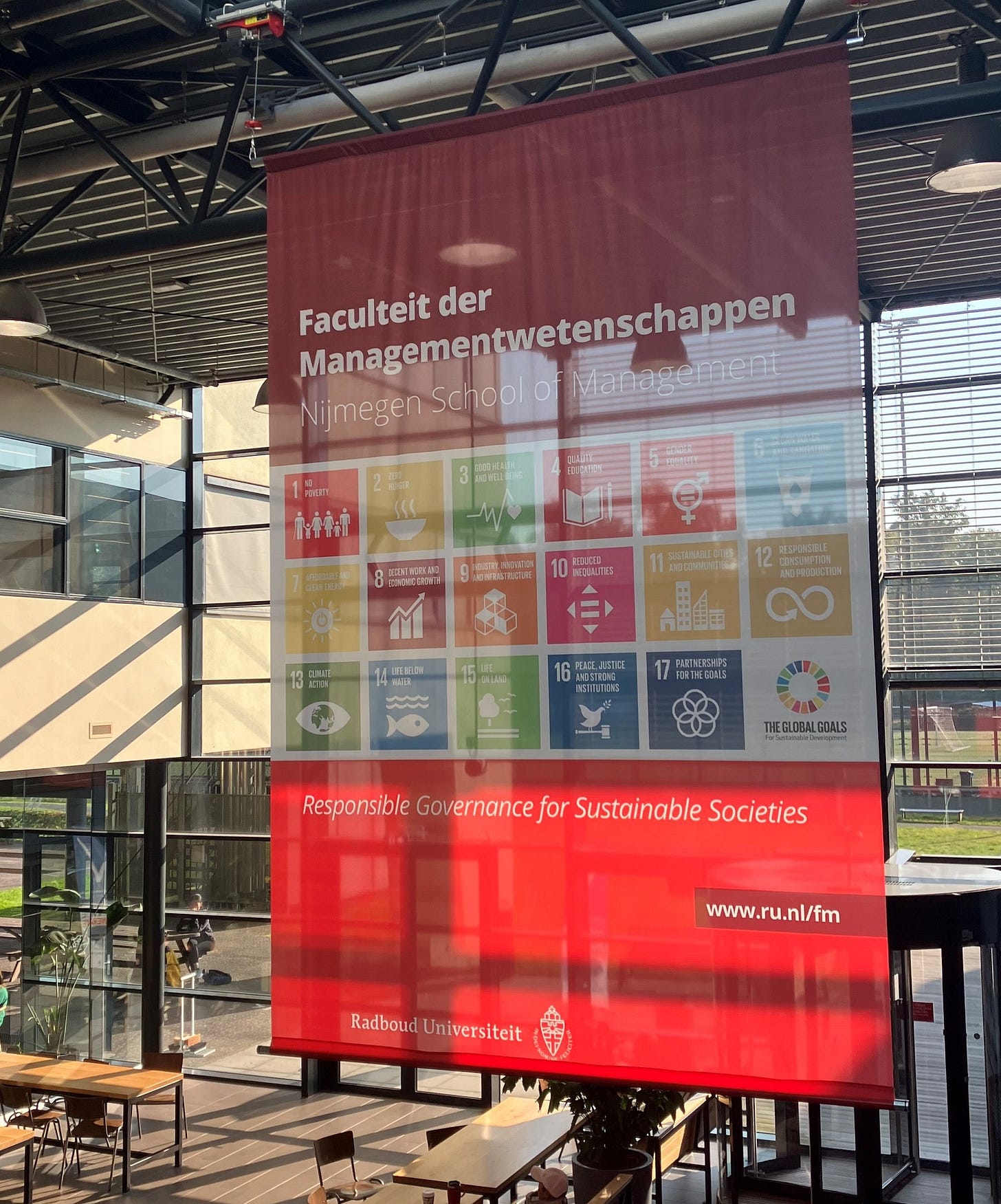Towards a transformative campus food policy
A treatise from the members of the Food Systems Interest Group
We are happy to publish a critical essay on the state of campus food from the Food Systems Interest Group (The FIG). As the RCSC is driving an argument that suggests the pathway to meaningful sustainability is to politicize it’s core positions, the FIG offers a guide for how we can accomplish such critical reflection with campus food.

The treatise in brief
A campus food policy may describe a strong direction of what to eat, but can miss crucial questions about how food is produced.
We highlight six known problems from food system research (human exploitation, corporate food consolidation, toxic environments, local food, cultural foodways, and animal ethics) that complicate the ideal of a “sustainable diet.”
A dietary proscription claimed to be sustainable must also attend to:
(1) The labor conditions of the workers involved in production;
(2) How to free production and consumption from corporate control;
(3) The use of chemicals and synthetic fertilizers involved in production;
(4) The empowerment of localized food producers and other change agents;
(5) The importance of respecting or shifting cultural food consumption and production habits;
(6) More-than-human agency.
Exploring these thorny dimensions points to ways a university could motivate a transformative food system through its food policy and thus fulfil its ambitious sustainability agenda.
We call on Radboud University to establish a food policy council where students, staff and nature have a place for democratic dialogue on the shape of the food environment.
Radboud should actively draw from the strength of the bioregion and its (non)human actors in transforming the food system.
Introduction
Universities around the world are tinkering with how to institutionalize sustainable food through adopting models like a plant-based university or the Eat-Lancet diet. However, an uncritical view of sustainable food may be as problematic as thoughtless consumption. As Radboud University develops its own sustainable food policy, we need a critical yet humble approach that asks: what should we transform the food system to? And, who should benefit?
We are a group of students and staff devoted to diving deeper into issues of food systems research[1]. We study the leading edge of debates on food system transformation in our personal lives and student scholarship. Universities ought to be experimental breeding grounds for sustainability interventions and democratic experiments. The scientific evidence for shifting towards plant-based diets in terms of land use pressures on biodiversity and climate emissions is strong and demands policy action. But identifying a mere recipe of a sustainable or ethical diet tells us nothing about how to reach such a goal.
While our support for universities to promote sustainable diets is clear, the deep well of insights from critical food studies compels us to argue that a food transition should not be taken in dogmatic terms. The problem here is sleepwalking into known problematics of our global food system. For example, it is easy to imagine a plant-based system that still props up corporate power, drives human exploitation, threatens animal rights, and drives ecological destruction. Today, the horticultural and grain sectors deliver products with dangerous levels of pesticides, are vertically controlled monopolistic seed and chemical companies, manifest unsafe and dangerous working conditions for farm laborers, and drive biodiversity loss. This suggests the problems of the food system are not merely a matter of what we eat, but also of how our food is produced. Therefore, we raise six food system problematics that we ought to engage with in order to reach a holistic understanding of sustainable food. To avoid the trappings of the current food system, we stress the need to open up space for serious debate about these issues and build towards what we call a transformative campus food policy. In this vision, Radboud would not only “sign-on” to a regimen of food products, but truly lead in demonstrating a pathway for leveraging university catering, education, and procurement as a tool to transform the food system.
Six food system problematics

Human exploitation
The current food system is implicated in multiple avenues for the exploitation of human beings. These include wage insecurity, child labor violations, unsafe and toxic working conditions, a driving force for migration, and human slavery. Both the animal protein and horticultural supply chains deliver these injustices. The distinctions are important. For example, the berry industry is emblematic of labor regimes that rely on precarious workers, exposure to sexual violence, and exposure to pesticides. The meat and dairy industry, on the other hand, is implicated in unsafe working conditions in slaughterhouses and workplace violations. Despite important differences, the production of both plant and animal products in our dominant food system share structural forces that devalue human labor and thrive on human precarity. Being sensitive to and contesting animal suffering is a clear moral imperative. At the same time, we ought to have the capacity to look for interventions that reduce suffering of all kinds through any new food policy. A shift in diets may not consider attending to exploited workers in the industrial food system.
Distribution of power in the food system
What if the university prioritized a standard about the involvement of corporate consolidation instead of only advocating for a certain set of food types procured? Critical scholars of food system have long pointed out the role of corporate control as a root driver of the problems production systems develop. The current food system from production to distribution is globally controlled by a relatively small number of actors, what entails not only direct control of production but also financing and transportation, concentrating power and wealth and driving land grabbing, violence and dispossession. Scholars like Phil Howard demonstrate how only a handful of companies control decisions about a large majority of our food stuffs, agricultural fertilizers and pesticides, and seeds. The levels of consolidation and unbalanced power in the food system have led some scholars to suggest we are living in a “corporate food regime,” where the decisions about what to produce and how to produce are to be found dominantly through the logics of corporate competition rather than any other value or political force. Unlocking the transformative potential of the food system must therefore contest this corporate control.
Does mandating, for example, plant-based foods at a university make progress towards this goal? In a way, yes. Industrial meat corporations are one of the leading sources of corporate malfeasance and drivers of unethical and human exploiting practices. However, these same companies have increased their market share of the alternative protein sector. Shifting uncritically to certain plant-based foods may offer continued dominance of the consolidated industries to make decisions about the food system. The companies that dominate the horticultural trade are the leading provisioners of pesticides, herbicides, and mechanization. Shifting products within a corporate portfolio is insufficient to bringing about broader food system change.
Toxic Environments
The use of pesticides and herbicides in agricultural production is linked to mass loss of biomass in pollinating and flying insects and soil microfauna. Research attributes a 75% biomass decline in Europe likely caused by agricultural chemicals. Worryingly, these declines may induce trophic cascades, where insectivorous bird species reliant on these insects for food are also in decline.
The monocultural grain and vegetable sectors, established through the Green Revolution, are the leading drivers of pesticide and herbicide use. These systems create unsafe working conditions for farm laborers directly working in the fields, the consumers who eat pesticide residues, and glyphosate–the world’s most popular herbicide—is found in breast milk and male reproductive organs. Poor soil management and high winds leads to pesticide drift, where nearby residents to agricultural fields are exposed to unsafe levels of toxic chemicals. This toxic environment is globally unequal, where the brunt of over-use of banned pesticides ends up in the fields of the Global South.
Low-input production systems that involve animal husbandry to add fertilizer and control pests is a crucial tool to reduce the need for chemical pesticides. The contribution of some animals in the food system may be a key resource to lessen agriculture’s contribution to a toxic world.
Regional politics and landscape ecology
In a changing climate, research suggests resilient bioregions will be both a crucial mitigation and adaption strategy. Therefore, peri-urban food systems must empower actors to shape dynamic and diverse landscapes. The question of how shifting to plant-based proteins from current mixed livestock operations strengthens or weakens regional food networks is crucial. How can the goal of strong resilient bioregions be supported through a switch to plant-based diets? How might an over simplistic switch to plant-based food hinder this goal?
One of the key arguments for a plant-based food system is the efficiency gains achieved through reduction in animal farming. However, an overemphasis on yields may lock in the legitimacy of large-scale monocultures. Smaller farms produce higher yields than large farms while promoting more biodiversity and remaining just as profitable. A food system solution must pay attention to the way a focus on yield efficiency may foreclose the radical potential of a matrix of smallholder biodiverse farms. Regional food webs, through markets of solidarity can realize alternative value chains that prioritizes ecological diversity, participation, and other agroecological principles instead of yields. These local producers have valuable local knowledge about sustainable production practices and regional varieties that could form the basis of newly imagined cultural foodways that synergize with sustainability. The extent to which a plant-based food system marginalizes rather than empowers bioregional actors is an area for crucial concern.
Cultural foods
The traditions that shape how we eat is also a powerful pathway to sustainability. Food possesses a deep cultural component that shapes decisions about what we eat, what we produce, and how we consume. The diversity of cultural foods has been on a steady decline, which may block important pathways to new sustainable and enriching dietary cultures. The homogenization of our diets disconnects people from their local food systems and undermines the social sustainability of local culinary practices. A plant-based food system can certainly create culturally rich and diverse diets, yet could fall in the trap of reproducing Western diets, full of refined sugar and ultra-processed cereals. Thus, the environmental and social crises that drive the plant-based transition can only be solved if we consciously adopt a food culture that prioritizes the impact on the world of the food we eat.
Arguably some of the most sustainable food systems in the world are dependent on the cultural consumption of animals. In the indigenous Salmon fisheries of the Pacific Northwest, the historic connection to Salmon foodways instills a centuries long commitment to the persistence of the fishery. Tribal efforts to preserve the longevity of salmon runs has led to the removal of extractive dams, landscape level ecological restoration, and dignified rural work. It must be considered, then, that the persistence of the Salmon species is dependent on their cultural consumption.
Animal ethics
Reflecting on the necessity and ethicality of animal oppression within our food systems challenges the legitimacy of an agriculture that relies on animal exploitation. Concepts like animal welfare fall short of recognizing nonhumans as dignity-bearing individuals. Even if animal husbandry may be an important sustainability tool, a commitment to animal ethics urges us to reconsider the necessity of any animal involvement in our production systems
The call for multispecies justice - that is, the concern for the well-being of and justice toward more-than-human-life-forms - produces an uncomfortable tension between two promising forces for food system change: animal liberation and the movement for food sovereignty. While food sovereignty resists corporate control of the food system through prioritizing farmer empowerment and democratic consensus, its movements depend partly on animal power which has implications for treating animals as commodities by keeping animals for manure, fertilizer, milk or meat production. At the same time, a vision of animal liberation may end up prioritizing animal interests over achieving transformative change in the production of food. After all, it was the displacement of animal-based soil amendments with fossil fuel derived synthetic fertilizers that unleashed the industrial livestock system onto the world.
Debating the morality and practice of animal violence within marginalized alternative food production systems is welcome, as these tensions reveal a common antagonist. Both the theory of change from food sovereignty and from animal liberation are joined against industrial production methods. Where multispecies justice seeks to address the roots of violence against animals, food sovereignty places the focus on the politics of food system change. Perhaps both movements can learn from each other.
Towards a transformative campus food policy
Proposals like the Plant-Based University Campaign is a welcome entry point into the broader messy world of food politics. We offer this essay to stimulate a collective need to debate questions of sustainable food rather than accept simple proscriptions. A deeper guiding concept we offer is food justice, which demands that Radboud question what inequities need to be undone, what forces need to be countered, and how to operationalized sustainable food at Radboud and across any university campus. Two concrete policy changes support this goal:
A food eco-democracy
If the root problem of the food system is the unequal distribution of power stemming through corporate influence, then a food solution may prioritize food democracy. Food democracy can be transformative when students and staff actively shape the food system rather than consume passively. A deep or strong food democracy avoids market-thinking through the codetermination of values from stakeholders such as students, professors and food and beverage. This could mean deploying a food policy council, a deliberative body made up of the broader Radboud community that lends legitimacy to food policymaking. An active participation in food can represent different worldviews, mediates agonism between parties, and offers solution directions to the many ethical and sustainability quandaries implicated in what we eat. This shifts the control away from corporate food systems to the local community, entering into direct partnerships and dialogues with farmers, rather than serving the interests of multinational companies.
However, food democracy may still miss moving towards increased animal rights and multi-species justice. An eco-democracy includes the voice of the non-human, taking the environment, nature and our planet as a point of departure rather than merely humans. While direct representation is impossible, knowledge regarding the interests of nonhuman species can still be utilized. Internationally, rights have been given to nature, such as rivers and lakes, often protected and represented by representatives and special councils, through appointing ‘eco-advocates’. The acknowledgement of rights to nature on campus and the establishment of a nature council have already been suggested, though no concrete action has been taken yet. The eco-democracy format has demonstrated imperfections, but this an opportunity for universities to act as places of research and frontrunners of change.
Engagement with the bioregion
The promise of local food systems is “social embeddedness” or a capacity to build social relations with food producers and workers, creating a path for equal negotiation and circumstances for farmers. Local food systems are no uncontested solution, and do not automatically lead towards food justice. Local food systems can still reproduce the problems mentioned earlier, like significant exploitation and toxic environments. However, with responsible practices and governance, local producers could be strong allies in the food transition, supporting the cultivation of culturally significant and diet-appropriate foods that students and staff would enjoy consuming. This can assist in rethinking our diets, recreating a relationship through discovering which plant-based products can be produced ecologically and locally, and which use of animals in farming would facilitate ecological production. Through these local relationships, a form of bioregionalism is advanced, driving a place-based production logic determined by what the bioregion allows, a key strategy to break the logics of environmentally destructive production.
Conclusion
Radboud has embraced an ambitious sustainability platform, with sustainability testimonies, the Green Office, the Radboud Centre for Sustainability Challenges, as well as Radboud hosting the Earth System Governance Conference last October, where catering was 100% vegan. Food policy is a crucial tool to help the university meet its own stated sustainability aims. Radboud could adopt a “diet” that is claimed to be sustainable, or it could emerge as a thought leader in rethinking the agrifood system.

[1] Staff of the Radboud Centre for Sustainability Challenges and students comprised of the Food Systems Interest Group composed this essay. Contributing authors include Mathéa Debant, Teun Kemmerling, Tiegan Wilkinson, Stan Reijnen, Adam Calo, Luka Schepens, Gilles Zuidwijk, and Bram van Hees. Contact: fig@ru.nl



